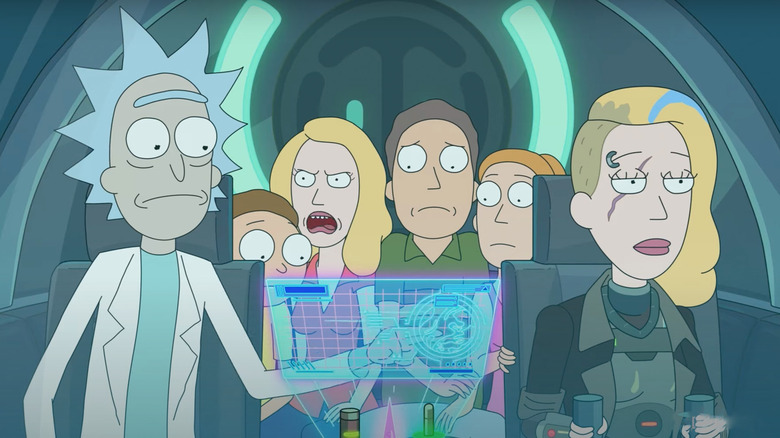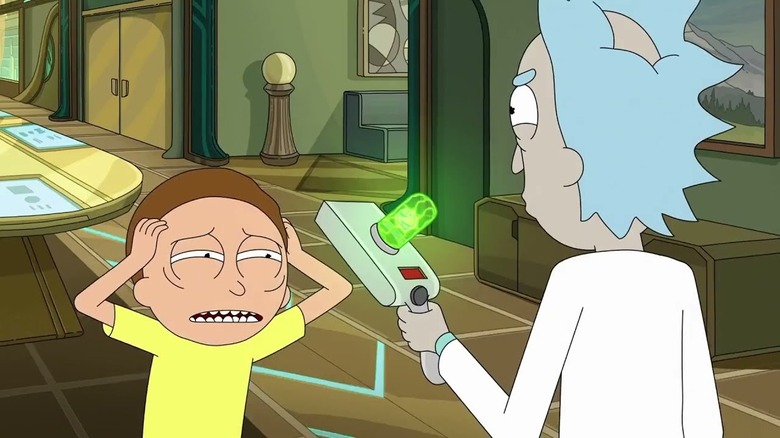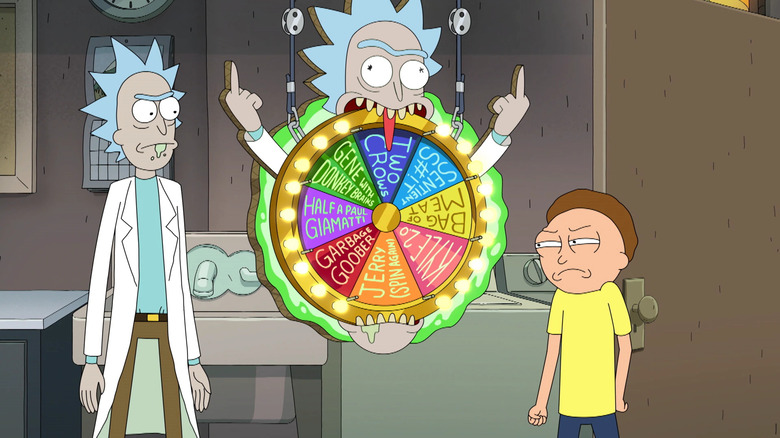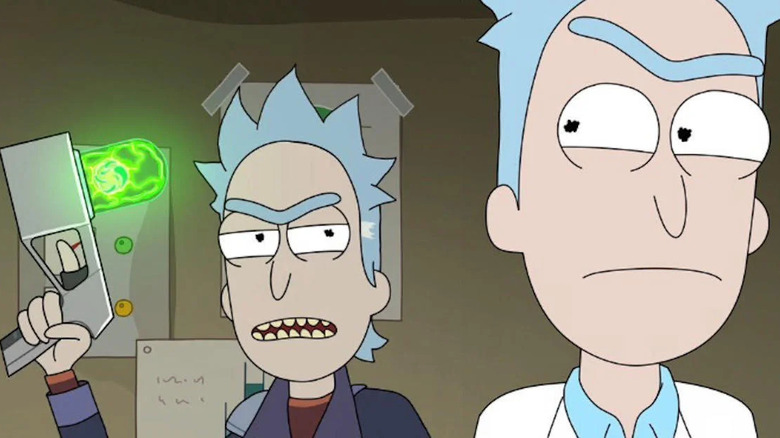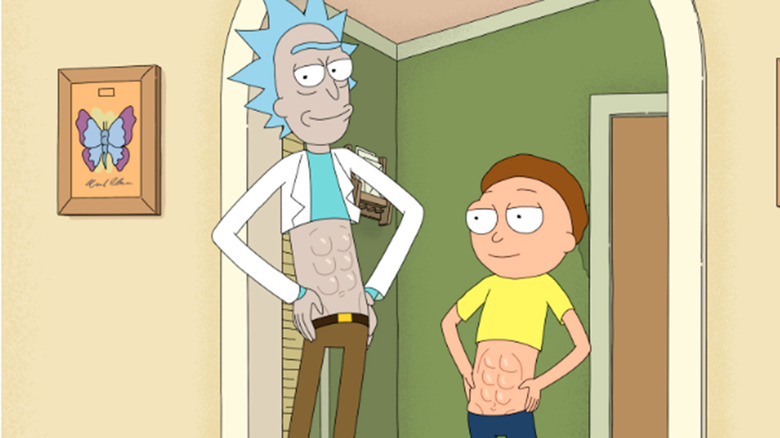Why Rick And Morty Season 6 Doesn't Deserve Its Low Ratings
Sometimes, I almost miss the days when "Rick and Morty" fans were annoying everyone by running the Pickle Rick meme into the ground, or causing chaos at McDonalds restaurants throughout the country. For the first half of season 6, unless you were actively seeking the fandom out, it was easy not to even notice that the new season was airing at all. So far, the episode's ratings are averaging around 0.6 million viewers an episode, a far cry from its ratings height of 2.5 million back in season 3.
A lot of this is just a natural side-effect of streaming taking over the TV landscape, but I can't be the only one noticing that there hasn't been much buzz on social media about the show either. Most of the posts that do go viral about "Rick and Morty" these days are just about how the author of the post has stopped watching it, or they're complaining about all the incest, which is fair.
Although everyone at Adult Swim seems confident that "Rick and Morty" isn't at any risk of cancellation any time soon, it does seem like the hype around the show has died down, possibly forever. It's a shame, because if there was ever a season that deserved some hype, it's season 6.
No portal gun? No problem
At the end of season 5, Evil Morty executes his master plan of destroying the central finite curve and cutting himself off from any universe in which Rick is the smartest person in it. It's not quite as evil a scheme as the show originally led us to believe, but it did have one clear-cut, lasting effect: Rick's portal gun is broken. For the first half of season 6, Rick's been trying and failing to fix his portal gun in the background, never quite succeeding until the dinosaurs come along and fix it for him.
As a result, season 6 so far has been something of a bottle season. For the first time in the show's history, Rick has been unable to travel wherever he wants at any time, which means we've gotten six episodes in a row where the family's mostly stayed in the same general place the whole time. It's led to a string of quieter, more introspective episodes, something the show turned out to very much need.
"Bethic Twinstinct," for instance, is an episode that takes place over a single Thanksgiving holiday. It takes a single concept — what if Beth fell in love with her clone — and follows it to its natural conclusion, taking the time to explore how it affects everyone in the family and showing how their feelings evolve on the situation. The show's writers are never going to beat the incest fetish allegations at this point, but it's still an episode that deserves credit for feeling more focused than nearly anything in season 5.
Gone is the aimlessness of seasons 4 and 5
A common complaint you'd hear about the show in seasons 4 and 5 is just how unimportant most of the episodes felt. Whereas season 3 had the running thread of Beth and Jerry's divorce tying all its episodes together, the next two seasons had little in the way of any kind of season-long arc. The closest we got was a trend of Beth and Jerry gradually becoming a healthier couple, and of Morty and Summer becoming increasingly self-assured. If you were hoping to get any sort of closure to the whole Evil Morty cliffhanger of season 3's "The Ricklantis Mixup," tough luck: it's barely mentioned until the season 5 finale.
"Rick and Morty" turned this aversion into something of an ongoing character arc for Rick: Rick often acts like he's on a TV show, and he doesn't like serialization because it means that things will permanently change. The appeal of a traditionally episodic style of sitcom television is the sense of familiarity it brings, that sense that everything will go back to normal at the end of the day.
This is part of what's allowed "Rick and Morty" to avoid completely running out of steam over six seasons, but for Rick, it's also what enables him to never look inward or bother with trying to grow as a person. After all, if nothing matters and he's always got a quick reset button on hand, there's nothing stopping Rick from casually going on consequence-free adventures for the rest of his life. But as the final two episodes of season 5 made clear to Rick, this carefree episodic style can't go on forever, not without him losing Morty.
No longer afraid of canon
That's why season 6 Rick is a version of Rick that's actually sort of trying. Nearly every episode has zeroed in on Rick's relationship with another member of the family, and given us a glimpse of how much healthier their interactions have gotten over the years. Rick's friendship with Jerry in particular is a highlight of the season; season 6 Rick still gets annoyed at Jerry's pathetic nature on occasion, but he's also come to respect the guy's general decency and his ability to find happiness in normal, everyday life.
Rick's newfound ability to care about the people around him is reflected in the way the show's moved away from the strictly episodic nature of the previous seasons. Season 6 is filled with storylines that build off characters and settings that have been established before. Space Beth is back repeatedly, as is the family's original dimension that was taken over by Cronenbergs, as is the Roy videogame. Rick has spent the past two seasons in a quasi-depressive state, intentionally choosing self-contained adventures with limited continuity; season 6 Rick is actively moving forward in life, and he gives the whole show a sense of direction by doing so.
Showrunner Dan Harmon described season 5 as having "almost a compulsive aversion to canon, and then a big episode at the end that promised all of it." He described season 6, meanwhile, as an attempt to "hit that ratio the right way."
Just a more confident show in general
This is all a little beside the point, of course. The most important thing is that the jokes are just funnier this year. They hit harder and more consistently, maybe because of how closely connected they are to the situation at hand.
Or maybe the show's funnier because it's dialed back on the self-conscious meta humor. "Rick and Morty" was always a show that seemed deeply aware of the fact that it was a TV show, but season 5 in particular really went overboard with the fourth wall jokes. Seemingly every time a trope of any sort occurred, the show would make sure a character would remark on the trope. This sort of humor is funny in small doses, but by season 5 it's constantly breaking immersion and undermining any sense of stakes. Season 5 "Rick and Morty" could never stop reminding its audience that none of this is real.
But after five seasons of leaning increasingly further into meta humor, season 6 finally dials it back. The show still bases its episodes around interesting, familiar sci-fi concepts, but it doesn't feel as much of a need to self-consciously point out to us what it's doing. More than anything, the "Rick and Morty" writers seem to know that these episodes are good and they're happy to let the story speak for itself, instead of prematurely negging it on our behalf.
Look, we understand that season 5 of "Rick and Morty" was divisive. We get that "Rickdependence Spray" might've been a dealbreaker for a lot of you, and you may have given up on the show entirely. But as the second half of season 6 airs on November 20, we recommend you tune in. The show's more than earned itself a second chance.
